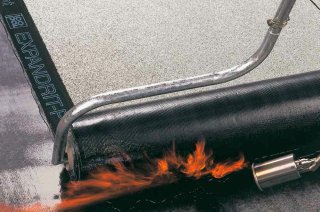
category_news
Icopal develops first 100% biobased roofing
Together with roofers and scientists, Icopal has started the development of a new generation of waterproofing roofing material made exclusively from renewable raw materials. The scientists in the project work at Wageningen Food & Biobased Research. The close collaboration with researchers on the one hand and roofers on the other hand will lead to the first 100% biobased roofing membrane that is not only scientifically sound, but can also preferably be fitted into the existing production-process of Icopal and application techniques of roofing, without any compromise on product quality. In short, a true "drop-in" alternative to existing roofing materials. The projectname is 'DISCOVER', meaning ‘Development of Innovative Sustainable COVEring materials for Roofings '.
The goal of the collaboration is to develop a complete biomass-based roofing membrane. Projectmanager Wouter Jan van den Berg explains why Icopal started this project: ''The newly developed membrane is an alternative to conventional roofing materials which are high quality products with a long life-time, but are made mainly from fossil raw materials and its derivatives; like bituminous roofing based on the oil derivative bitumen, or synthetic membranes that are based on polymers stemming from the petroleum chemistry. The uncertainty of petroleum exploitation, the by consequence high fluctuations in price, as well as the CO2 footprint motivate us to look for alternative renewable raw materials. The target is to maintain the technical and functional characteristics. "
Project approach
Several possible bio-based substitutes for bitumen, such as residues from agriculture and the paper industry, are taken as a starting point in the project. The environmental impact as well as the impact of the various natural ingredients on key product requirements such as water resistance, durability, workability and strength will be investigated. A comparison of different compositions should ultimately lead to a recipe that yields the best performance and can be produced at the lowest cost and without any negative environmental impact. For this last purpose, an LCA will be conducted. The challenge is to develop a roofing material without having to change current production and application methods. Eventually, a prototype of a bio-based roofing membrane will be tested extensively as a demo-roof under out-door conditions. The final product provides a sustainable alternative for roofers and will provide them an advantage in their projects where durability is always required.
Step forward towards circular economy
"The project fits into the sustainability strategy of Icopal. The company continually looks for ways to reduce the use of fossil raw materials and other resources, like energy. As a leader in the area of recycling of roofing material (production loss, cutting residues as well as used roofing material) and supplier of the most sustainable roofing Icopal also wants to be number one roofing company with respect to the use of natural resources. A fully bio-based roofing accepted both by roofers and roofing customers has not been developed yet and will be an important step towards a circular economy," says Wouter Jan van den Berg.
The DISCOVER project is part of the Biobased Performance Materials (BPM) programme. The BPM programme, under the direction of Wageningen Food & Biobased Research, aims to develop bio-based materials as an alternative to raw materials made from crude oil. The BPM programme is co-financed by the Dutch Top Sector Chemistry.
For more information on this project, please go to the websites of Icopal and Wageningen University & Research.